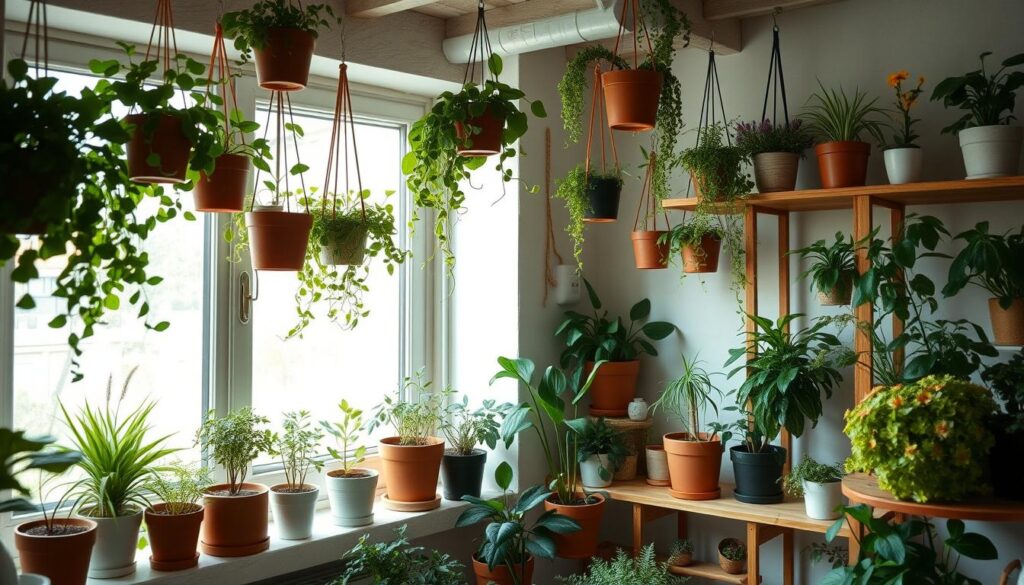Have you ever thought about which plants do well inside and make your life better? Indoor gardening brings many benefits. It makes your home look better, cleans the air, and lifts your mood and mental health. By picking the right plants for your indoor space, you can create a beautiful and healthy garden.
Success in indoor gardening comes from knowing what plants need and their benefits. You’ll find everything from air-cleaning plants like the snake plant to eye-catching ones like the fiddle leaf fig. Let’s look at the top plants for indoor gardens and see how they bring nature and calm to your home.
Key Takeaways
- Indoor gardening can boost your mood and improve air quality.
- Select plants that are well-suited to indoor conditions for optimal growth.
- Snake plants and fiddle leaf figs are popular choices for indoor gardening.
- Understanding each plant’s water and light requirements is crucial.
- Adding indoor plants can create a vibrant and tranquil home environment.
Choosing the Right Indoor Plants for Your Space
Choosing the right plants for your home is key for their growth. Look at your windows to see if they face north, south, or west. This helps you pick plants that like the light they get. Also, think about the humidity, temperature, and airflow in each room. This way, you can pick a plant that looks good and grows well in its spot.
Understanding Light Requirements
It’s important to know what light each indoor plant needs. Plants like succulents and cacti love strong sunlight all day. For less light, plants like philodendrons and pothos do well in east or west windows.
If your space is very dark, plants like ZZ plants and cast iron plants can survive. They don’t need much light to stay healthy.
Selecting Plants Based on Room Conditions
Every room in your home is different and affects how plants grow. Ferns love the moist air of bathrooms. Air plants prefer bright, indirect sunlight and a bit of misting.
In living rooms, rubber trees and philodendrons like bright, indirect light and need water once a week. In kitchens, herbs need full sun. Bedrooms are great for low light plants like spider plants and succulents.
Always check an indoor plant care guide for each room. This ensures your plants get the right care and stay healthy.
Low Maintenance Indoor Plants for Busy People
For busy people who love plants, the Snake Plant, ZZ Plant, and Pothos are great choices. These plants are easy to care for and can thrive in different lighting conditions. They’re perfect for anyone who doesn’t have time for plants that need a lot of attention.
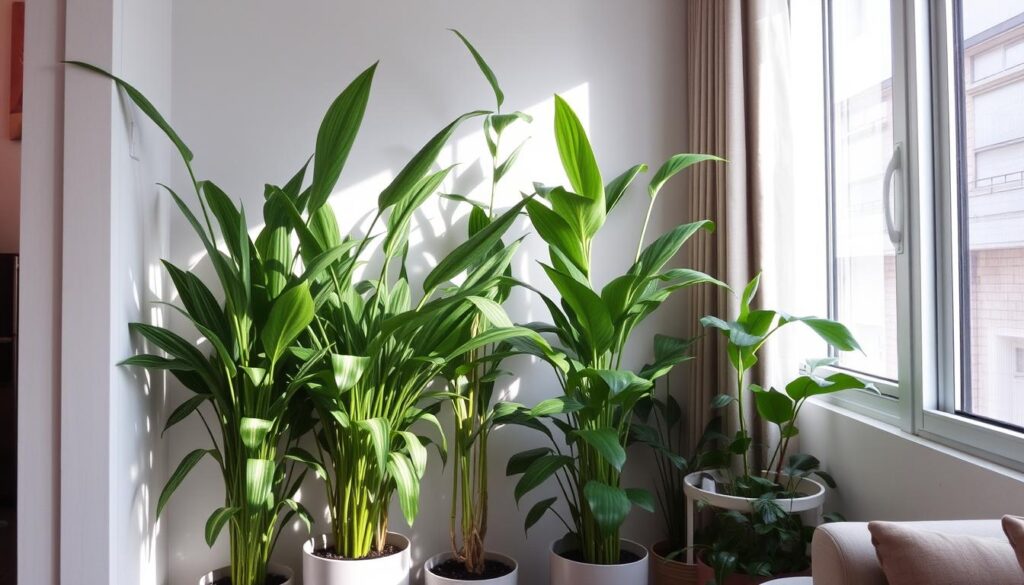
Snake Plant
The Snake Plant, also known as Mother-in-Law’s Tongue, has long, sword-shaped leaves. It does well in low to bright indirect light and only needs watering every 1-2 months. This makes it ideal for busy people.
It’s also great at cleaning the air, removing toxins to make the air healthier. Plus, it can survive in tough conditions, making it a reliable choice.
ZZ Plant
The ZZ Plant comes from Eastern Africa and is known for its glossy leaves. It’s very drought-tolerant, so it can go without water for a while. This means you only need to water it once a month or less.
It can grow well in both bright and low light, making it easy to fit into any room. The ZZ Plant is perfect for anyone who wants a beautiful plant without the hassle.
Pothos
Pothos is a popular plant known for its trailing vines and heart-shaped leaves. It’s great for both homes and offices because it can grow in low light and can survive if you forget to water it sometimes.
It can adapt to different lighting conditions and only needs water when the soil feels dry. Pothos not only looks good but also helps purify the air, making your space healthier.
Choosing these low maintenance indoor plants can make your space look beautiful without a lot of work. They add to the air quality and create a peaceful atmosphere without needing constant care.
Best Indoor Plants for Beginners
Starting with indoor gardening? It’s key to pick plants that are easy to care for. Plants like the philodendron are great because they do well in low light and like temperatures between 60-85 °F.
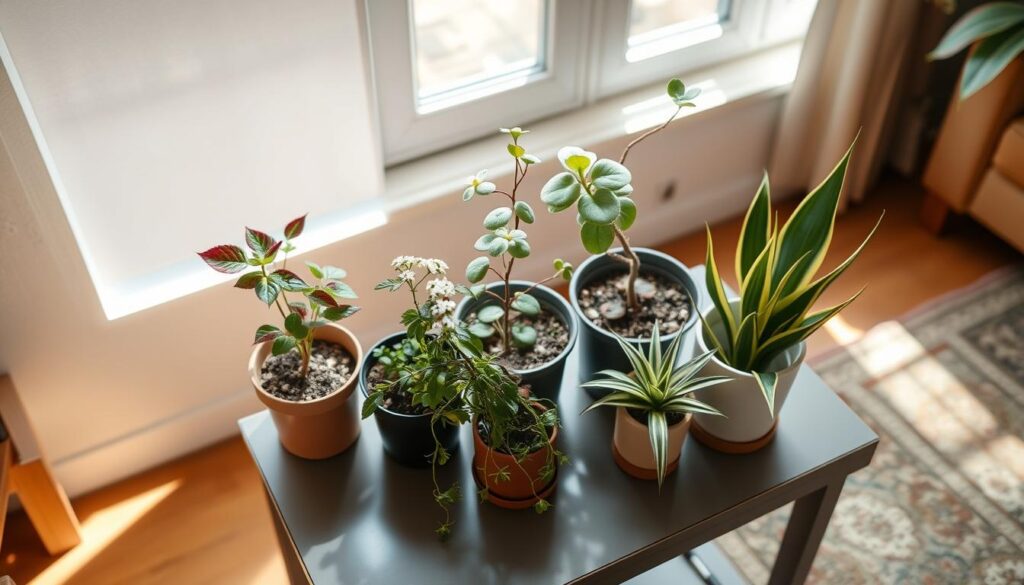
The spider plant is another great choice for new gardeners. It loves medium to high light and temperatures between 60-85 °F. Plus, it’s easy to spread out because of its “spiderettes.”
If you want something elegant, the peace lily is perfect. It has beautiful white flowers and cleans the air. It prefers medium to low light and temperatures from 65-80 °F. But, keep it away from pets because it’s toxic.
These easy indoor plants make your space look better and are fun to take care of. With the philodendron, spider plant, and peace lily, you can easily create a beautiful indoor garden.
Low Light Plants that Thrive Indoors
Creating a lush indoor oasis is easy with the right low light indoor plants. These plants do well in areas with little sunlight. They’re great for north-facing rooms or dimly lit offices. Let’s look at some tough options.
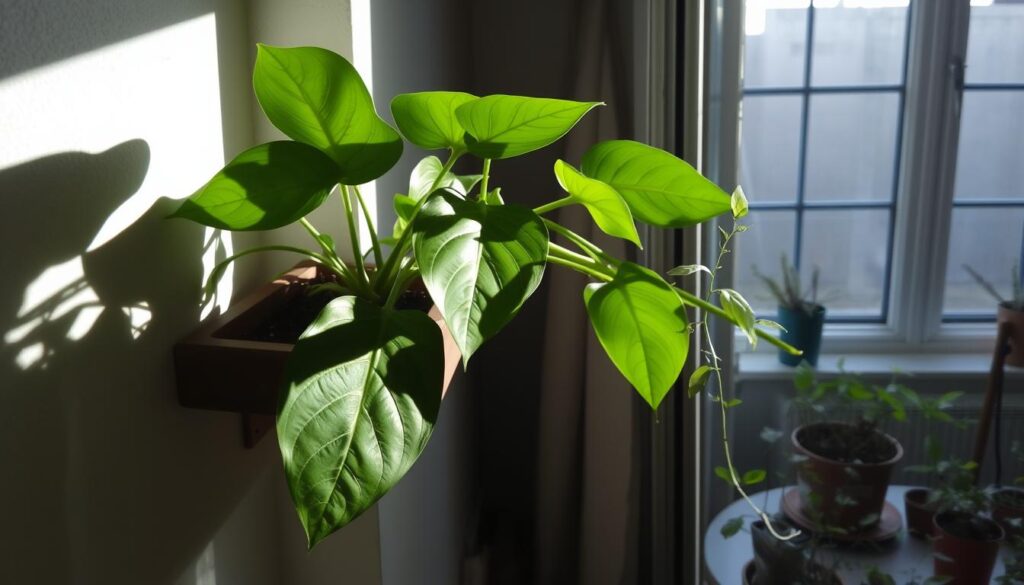
Cast Iron Plant
The Cast Iron Plant (Aspidistra elatior) is very resilient. It thrives in low light and needs little care. These plants can grow up to 3 feet tall. They’re perfect for adding beauty to your space.
With their broad, dark green leaves, they add elegance to any area.
Chinese Evergreen
The Chinese Evergreen (Aglaonema) is great for low light. It can grow up to 3 feet tall and adapts well to dim light. Most varieties prefer less bright spots but will do well in low light.
These plants are easy for beginners and add greenery to your home or office.
Peace Lily
The Peace Lily (Spathiphyllum) is known for its beautiful white spathes. It thrives in low to moderate light and can grow up to 3 feet tall. It’s also a great air purifier.
This makes it a top choice for indoor plants. With little care, the Peace Lily is ideal for those wanting to brighten their indoor space with low light plants.
Air Purifying Indoor Plants
Air-purifying plants clean the air naturally. They remove pollutants through photosynthesis and absorb harmful gases. This makes the air healthier to breathe.
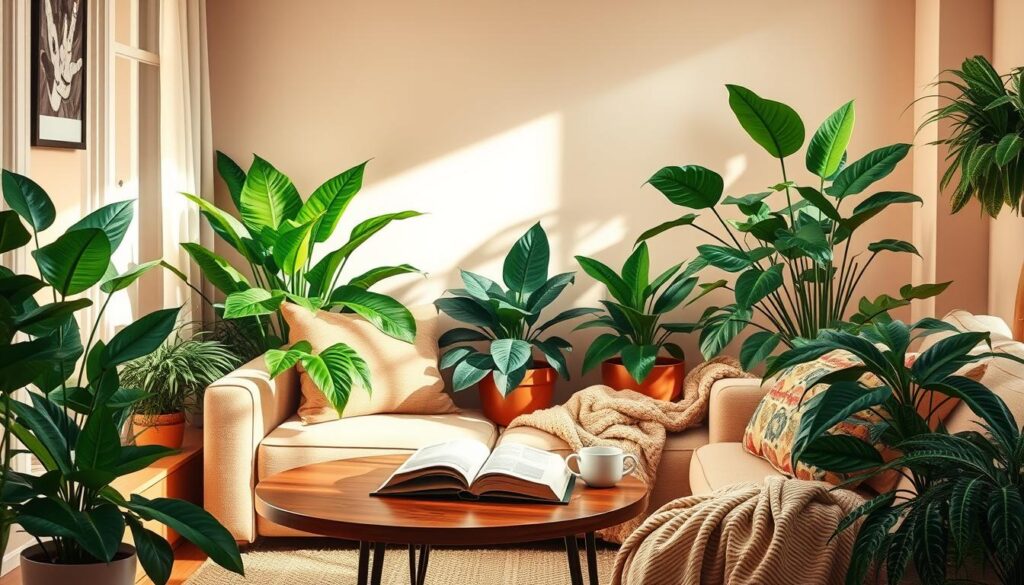
Spider Plant
The Spider Plant is great at removing toxins like formaldehyde and xylene. It’s easy to care for and fits well in many rooms. Plus, it’s safe for pets, giving pet owners peace of mind.
Rubber Plant
Rubber Plants have big, shiny leaves that help purify the air. They take out harmful gases like formaldehyde. They also look beautiful and need bright, indirect light to stay healthy.
Areca Palm
The Areca Palm adds a tropical feel to your space. It’s a strong air cleaner, removing pollutants like formaldehyde and xylene. Make sure to water it regularly to keep it looking great.
Decorating with Indoor Plants
Adding indoor plants to your home can change the look and feel of your space. It brings beauty and calmness. With many indoor plant decorating ideas, you can make your home lush and welcoming.
Creating a Green Wall
A green wall is a standout indoor plant décor idea. Use plants like the Monstera deliciosa for a unique look. This not only makes your room look better but also improves the air quality.
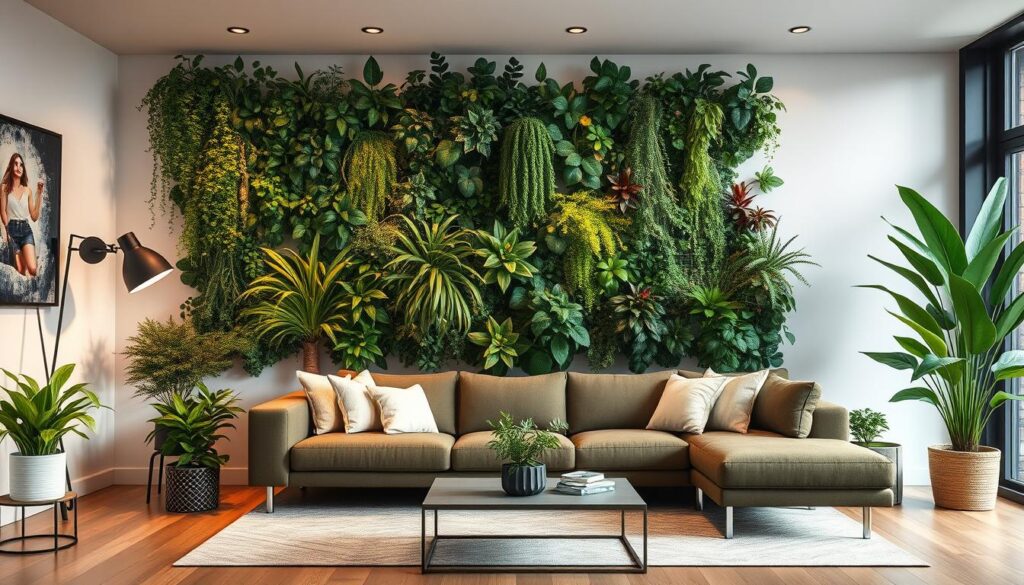
Using Plants as Table Centerpieces
Plants are great as table centerpieces. For example, peace lilies on your dining or coffee table add elegance and clean the air. You can find these plants online, from $24 on Amazon to $20 at Walmart.
Hanging Plants and Vertical Gardens
Hanging plants and vertical gardens add greenery to your home. Trailing plants like pothos or spider plants work well in hanging pots or vertical planters. They fill vertical spaces, adding greenery without taking up much floor space.
By choosing and placing your plants carefully, you can mix nature into your home design. From green walls to hanging plants, these ideas will make your home welcoming and peaceful.
Indoor Plant Care Tips
Proper care is key to keeping your indoor plants healthy and bright. This guide offers essential tips for a beautiful and lively indoor garden.
Watering Best Practices
Overwatering is the top reason houseplants fail. Check the soil before you water to avoid this mistake. Water your plants when the top 1 to 2 inches of soil feel dry.
Make sure the soil drains well to prevent root rot. Too much water can cause wilting and diseases. On the other hand, not enough water leads to wilting and losing leaves.
Fertilizing Your Indoor Plants
Feeding your houseplants well leads to healthy growth and more flowers. They usually need less fertilizer than outdoor plants. Use a balanced, liquid fertilizer during the growing season.
For plants that bloom, a fertilizer for flowers is a good choice. Pennington Rejuvenate Premium All-Purpose Potting Soil Mix provides nutrients for up to six months.
Pest Control for Houseplants
Pests like mealybugs and spider mites can harm your indoor plants. Check your plants often for pests and treat them as needed. Signs of low humidity include curled leaves and yellowing.
To increase humidity, mist your plants or use a humidity tray. Grouping plants together also helps. Regular grooming and pruning keep plants tidy and pest-free.
Follow these tips to make sure your plants do well. They will make your space more beautiful and healthy.
Best Plants to Grow Indoors
Indoor settings are perfect for many plant types that can grow well and offer great benefits. The Snake Plant is a top choice for its easy care and ability to clean the air. It’s a favorite among gardeners for these reasons.
The Fiddle Leaf Fig is great for adding a bold look to any room with its large leaves. These plants can handle different indoor conditions, making them perfect for indoor gardening.
Pothos is a great choice for indoor gardening because it’s easy to care for and can grow in various light conditions. Spider Plants are also a smart pick, being safe for pets and kids and good at cleaning the air. These plants are great for adding beauty, ease, or health benefits to your home.
These indoor plants are great for both new and experienced plant owners. Over 50% of people looking for indoor plant advice are beginners or have some experience. By picking the right indoor plants, you can make your home look better and improve your health.
FAQ
What are the benefits of indoor gardening?
How do I choose the best plants to grow indoors?
What light requirements should I consider when selecting indoor plants?
Which indoor plants are ideal for busy individuals with little time for plant care?
What are the best beginner indoor plants?
Which plants thrive in low light conditions?
What indoor plants are known for purifying the air?
How can I use indoor plants to decorate my home?
What are some essential indoor plant care tips?
Source Links
- https://www.gardendesign.com/houseplants/best-indoor.html – 24 Best Indoor Plants – Find Your Perfect Houseplant – Garden Design
- https://www.soultravelfitness.com/blog/2021/1/28/the-best-indoor-plants-for-beginners – The Best Indoor Plants for Beginners — SoulTravelFitness
- https://mycityplants.com/plant-decor/how-to-choose-the-best-plants-for-your-home/ – Home Plant Guide: How To Choose The Best Plants For Your Home, Where to Place Them, & How to Care for Them • My City Plants
- https://www.realsimple.com/home-organizing/gardening/indoor/best-indoor-plants – Your Guide to Choosing a Plant for Every Room in Your House
- https://succulentsbox.com/blogs/blog/top-10-low-maintenance-houseplants-for-busy-people?srsltid=AfmBOorZZO4Ira3OJKx7jcvu2upFSkTNKqaBONNG71N5OeXeQz4Z1qsL – Top 10 Low Maintenance Houseplants for Busy People
- https://jayscotts.com/blog/easy-care-indoor-plants/ – 12 Easy Care Indoor Plants: No-Fuss Greenery for Busy People Jay Scotts Collection
- https://www.provenwinners.com/leafjoy/easy-indoor-plants – 15 Easy Indoor Plants for Beginners – Can’t Kill Houseplants
- https://www.thespruce.com/the-best-houseplants-for-beginners-4767423 – 30 Best Houseplants for Beginners
- https://roomfortuesday.com/the-easiest-indoor-plants-that-thrive-in-low-light/ – The Easiest Indoor Plants that Thrive in Low Light
- https://www.bhg.com/gardening/houseplants/projects/indoor-plants-for-low-light/ – 31 Best Low-Light Indoor Plants to Brighten Up Your Home
- https://www.livelyroot.com/collections/low-light?srsltid=AfmBOoq5sggQ_ml38lR1jpoIRU7K-1RMPPEeesfu2YXoKT5v-6D793I_ – Low Light Indoor Plants Best for House & Office
- https://www.livelyroot.com/collections/breath-of-fresh-air?srsltid=AfmBOopJn4_Z3HGdyNZK55QmO4Nz_mjh5hUOXdCAhtCCXWK70MayKI7U – Air Purifying Plants to Enhance Indoor Living Quality
- https://www.co2meter.com/ms-sg/blogs/news/782922-nasa-compiles-list-of-best-plants-to-clean-indoor-air?srsltid=AfmBOoqV3Glx1vNTUSlyg–dfqERXY5w-85Ks7-k6jAhYar8EZc-qlDk – NASA compiles list of best plants to clean indoor air
- https://airhealth.com/blog/7-best-air-purifying-indoor-plants-air-health/?srsltid=AfmBOoqEF9ARVmTZJzF9isEFnL2SdNeCri-OqNDtv5KDPC4W8MGKah3s – 7 Best Air Purifying Indoor Plants | Air Health
- https://www.bhg.com/gardening/houseplants/wild-for-houseplants/ – 6 Expert Tips for Decorating with Houseplants So Every Room Feels Like an Oasis
- https://www.countryliving.com/gardening/garden-ideas/g1341/indoor-gardening/ – Looking for a new houseplant? Here are our faves!
- https://www.pennington.com/all-products/fertilizer/resources/8-steps-to-growing-a-healthy-indoor-garden-anytime – How to Grow and Take Care of Indoor Plants
- https://www.thesill.com/blog/top-ten-plant-care-tips – Top Ten Plant Care Tips for Houseplants & Indoor Plants – The Sill
- https://www.allrecipes.com/article/growing-vegetables-indoors/ – The 9 Best Vegetables You Can Grow Indoors
- https://www.goodhousekeeping.com/home/gardening/advice/g1285/hard-to-kill-plants/ – These Hard-to-Kill Houseplants Are Great for Beginners
- https://homesteadbrooklyn.com/all/2017/1/21/growing-plants-indoors-a-beginners-guide – Growing plants indoors: A beginner’s guide — HOMESTEAD BROOKLYN
